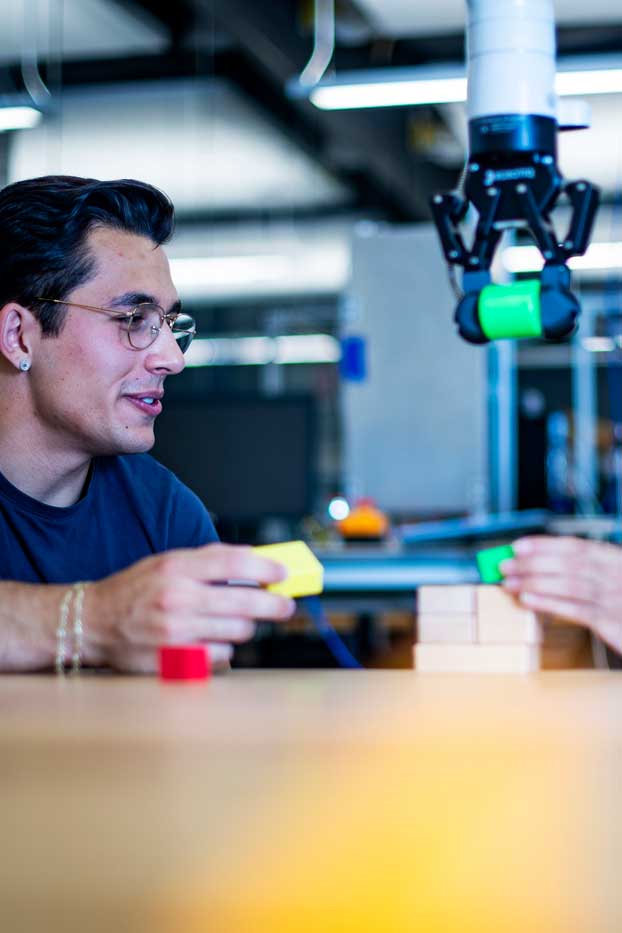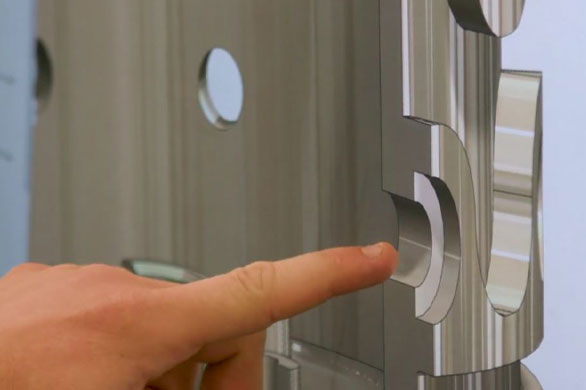
Bachelor of Science in Mechanical Engineering
Bachelor of Science in Mechanical Engineering
Overview
Mechanical engineering involves the design, development, and manufacture of machinery and devices to transmit power or to convert energy from thermal to mechanical form in order to power the modern world and its machines. Its current practice has been heavily influenced by recent advances in computer hardware and software.
Mechanical engineers use computers to formulate preliminary and final designs of systems or devices, to perform calculations that predict the behavior of the design, and to collect and analyze performance data from system testing or operation.
Traditionally, mechanical engineers have designed and tested devices, such as heating and air-conditioning systems, machine tools, internal-combustion engines, and steam power plants. Today they also play primary roles in the development of new technologies in a variety of fields—energy conversion, solar energy utilization, environmental control, prosthetics, transportation, manufacturing, and new-materials development.
Innovative Curriculum
The curriculum in mechanical engineering focuses on four areas: applied mechanics, thermofluids engineering, materials science, and controls. Applied mechanics is the study of the motion and deformation of structural elements acted on by forces in devices that range from rotating industrial dynamos to dentists’ drills. Thermofluids engineering deals with the motion of fluids and the transfer of energy, as in the cooling of electronic components or the design of gas turbine engines. Materials science is concerned with the relationship between the structure and properties of materials and with the control of structure, through processing, to achieve desired properties. Practical applications are in the development of composite materials, metallurgical process industries, and advanced functional materials. Controls are critical to any engineered system in which sensors and actuators of several types communicate and function.
Courses in each area form the foundation for advanced analytical and creative design courses that culminate in a two-semester capstone design project. Faculty encourages students throughout the curriculum to use computer-aided design tools and high-performance computer workstations.
Students have the option of selecting from several minors to complement their degree and personalize their path. Students can select from minors in the department, in other engineering departments, or from across the university.
The Accelerated Master’s Degree PlusOne program allows current undergraduate students to accelerate the attainment of the master’s degree by applying graduate credits taken as an undergraduate toward both the undergraduate and graduate degrees. Current students apply to enroll in the PlusOne program. Students attain their bachelor’s degree followed by a PlusOne year to complete the master’s degree.
Students currently earning a BS in Mechanical Engineering can select from the below MS degree PlusOne pathways.
The Bachelor of Science Program in Mechanical Engineering is accredited by the Engineering Accreditation Commission of ABET, www.abet.org.
Experiential Learning
Experiential learning is the heart of a Northeastern education, combining rigorous coursework with hands-on experience in the classroom, in the lab, and in the field—locally and abroad. With our signature cooperative education (co-op) program, students typically gain six months of work experience integrated as part of the educational program. Both five-year, three-co-op and four-year, two-co-op program options are available.
More than 90 percent of department undergraduate students take advantage of the cooperative education program. Cooperative education assignments increase in responsibility and technical challenge as students progress through the program. Initial positions may involve computer-intensive CAD/CAM assignments or programming tasks, while more advanced jobs will place students in charge of design, quality-control systems, and performance testing of equipment.
Academic Advising
For support with academic questions, contact the academic advisor assigned to this program.
Admissions & Aid
Ready to take the next step? Review Degree Requirements to see courses needed to complete this degree. Then, explore ways to pay for your education. Finally, review Admissions Information to see our deadlines and gather the materials you need to Apply.
Recent News
Professional Licensure: If looking for information on obtaining Professional Licensure, visit the Professional Licensure Disclosure Page or contact the Associate Dean for Undergraduate Education, Susan Freeman, at s.freeman@northeastern.edu.





